Just now
By Paul Kirby, BBC News, Paris

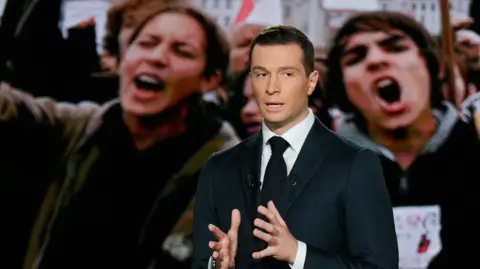 DIMITAR DILKOFF/POOL/AFP
DIMITAR DILKOFF/POOL/AFP
Jordan Bardella took part in a TV debate with Gabriel Attal three days ahead of the vote
France's lightning-quick election campaign is over, and despite last-ditch appeals not to back the far right, voters appear ready to hand the National Rally party a historic victory in parliamentary elections.
Prime Minister Gabriel Attal warned it would unleash “impulses of hate and aggression”.
But the party of Marine Le Pen and 28-year old Jordan Bardella, who could be the next prime minister, has if anything cemented its lead in the opinion polls.
National Rally has fended off a series of accusations of racism, involving party members as much as supporters. The big question now is whether it can win an absolute majority in two rounds over the next two Sundays.
They have a significant chance, after European elections on 9 June turned most of the electoral map of France dark blue. That was the moment Emmanuel Macron chose to stun the French people with a decision to call a general election in just three weeks.
National Rally (RN) is gearing up for a big night on Sunday, with one opinion poll hours before the campaign ended showing support at 36.5%.
Its candidates are hoping to win dozens of seats in the National Assembly outright on the night, with more than 50% of the vote. But most seats will be decided in run-off votes on 7 July, between two, three or even four contenders.
So opinion polls do not tell the whole story, and a hastily arranged left-wing alliance, the New Popular Front, also has its eye on victory, only a few points behind RN with 29%.
The Ensemble alliance, led by Gabriel Attal, lies in third on 20.5%, according to the Ifop poll. He argues both the other main blocs are extreme.
No area of mainland France backed National Rally in the European vote more than L’Aisne, a rural department in the north with just over 50% support.
Since 2022, L’Aisne has already had three RN MPs, and in the historic town of Villers-Cotterêts, they have had a National Rally mayor, Franck Briffaut, for a decade.
A party veteran of more than 40 years, going back to its old National Front days under Jean-Marie Le Pen, he feels the path to power has been inevitable, in the same way that Giorgia Meloni won elections in Italy.

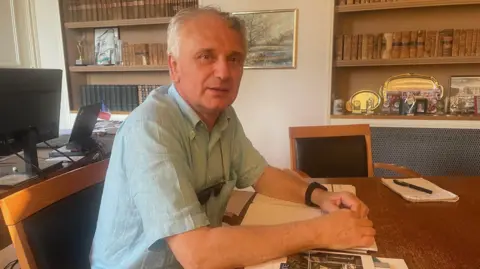
Franck Briffaut says his party has evolved over time and victory is inevitable
But like many in his party, he won’t settle for anything less than an absolute majority in the National Assembly, which would require at least 289 of the 577 parliamentary seats.
“I won’t be part of it, because it’s a trap set by Macron. I’m also convinced that if we get an absolute majority, he has to be made to leave. As long as he’s there, we can’t put through the entirety of our programme. Because we need changes to the constitution.”
President Macron has promised he is not going anywhere until his term ends in 2027, and it is his task to appoint the next prime minister after the second round of these elections on 7 July.
Jordan Bardella, whose campaign posters have “prime minister” written underneath his name, insists he won’t settle for less than an absolute majority.
That does leave open the question of who Mr Macron will choose if RN falls short. “There’s no point in Emmanuel Macron naming a prime minister nobody would want,” says constitutional expert Prof Dominique Rousseau. But if there’s no absolute majority, he says the president has room to manoeuvre.
It would usually come from the biggest party, but if they refused, he could look for a consensus figure instead, who could pull together what remains of the centre right and centre left.
For now, it is Jordan Bardella who is doing all the running, announcing during a TV debate two nights ago that he has some kind of “government of national unity” in waiting.
Mr Bardella has promised a government of all the talents, including as yet unknown “sincere patriots who have France’s sovereignty at heart”. However, he did name former conservative leader Eric Ciotti, who alienated most of his colleagues when he struck up an alliance with RN.
It may not sound convincing, and the prospect of power-sharing - or “cohabitation” - with President Macron sounds like three highly difficult years in French politics.
National Rally chief Marine Le Pen has already raised tensions by appearing to call into question the president’s role as commander-in-chief of the armed forces as merely “honorary”.
The intensity of this election campaign, and its importance, have prompted Interior Minister Gérald Darmanin to warn of the risk that the “ultra-left and ultra-right” may try to sow chaos after both rounds of the election. He has called on local prefects to exercise vigilance.
Away from the tempestuous politics of Paris. a Greens campaigner handed out leaflets to a handful of passers-by in the northern town of Soissons, run by a National Rally MP for the past two years.
He complained the RN had done nothing for this ancient and now disadvantaged town since he came to office.
In the main shopping street, people still refer to the party as National Front, despite the best efforts of Marine Le Pen to rebrand her party and shed its old image of racism and antisemitism.
Jonathan says the RN is no different from its predecessor, but is not unduly worried: "There are locks in place in the Assembly, in the constitution, so it’s not like they’re going to start a dictatorship here.”

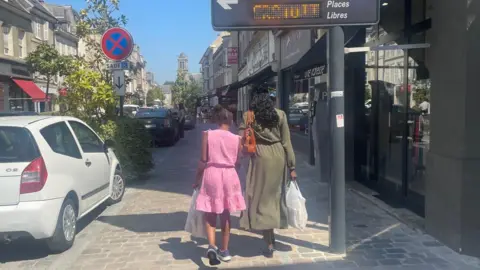
This mother said she did not expect RN to win such a high proportion of the vote
One mother said that living as a black family in a nearby village, it was worrying that the RN vote was so high: “It's immense. We didn’t expect RN to win the most votes in L’Aisne."
She too believes the far right will struggle to change the constitution, but she is more concerned about their rhetoric.
One of RN’s key platforms is “National priority”, restricting social welfare to French citizens, alongside tax cuts on energy and income tax exemptions for under-30s.
The party also says dozens of sensitive, strategic jobs would not be open to dual nationals in France, who make up an estimated 5% of the population.

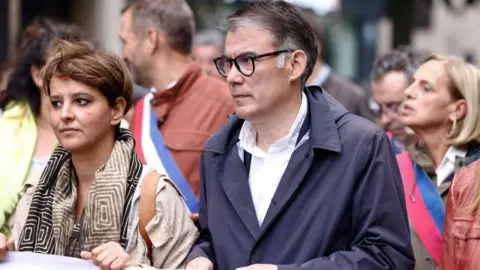 SAMEER AL-DOUMY/AFP
SAMEER AL-DOUMY/AFP
Former Socialist education minister Najat Vallaud-Belkacem (L) came to France aged four
One outgoing MP suggested the appointment of Moroccan-born former Education Minister Najat Vallaud-Belkacem had been “a mistake”.
Marine Le Pen quickly slapped him down, but it is clear that the issue of 3.3 million French citizens with a second nationality is not going to go away.
“We’re not really in favour of dual nationals,” Mayor Franck Briffaut told the BBC in Villers-Cotterêts, stressing it was only his personal view.
“It’s like bigamy. We’re in a civilisation where you can’t have bigamy. I don’t get dual citizenship - you belong to either one or the other. You can’t love two countries - just like you can’t be married to two women.”

 5 months ago
43
5 months ago
43

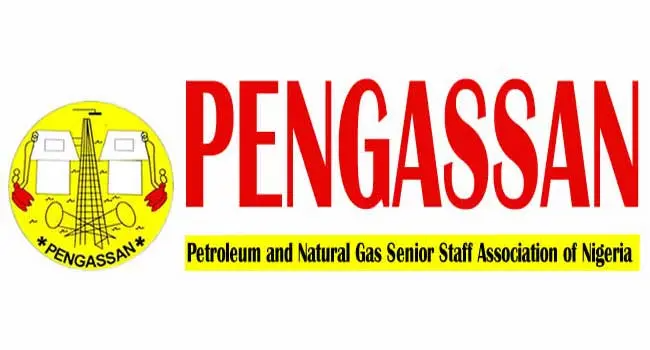
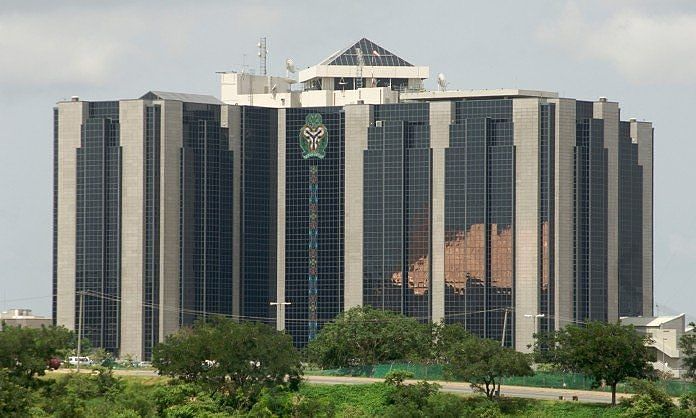

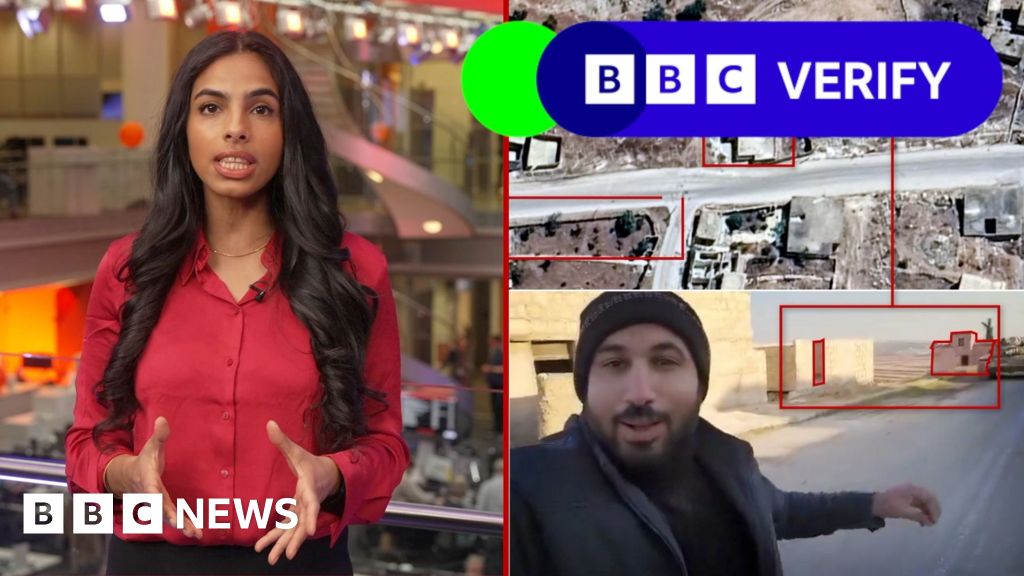
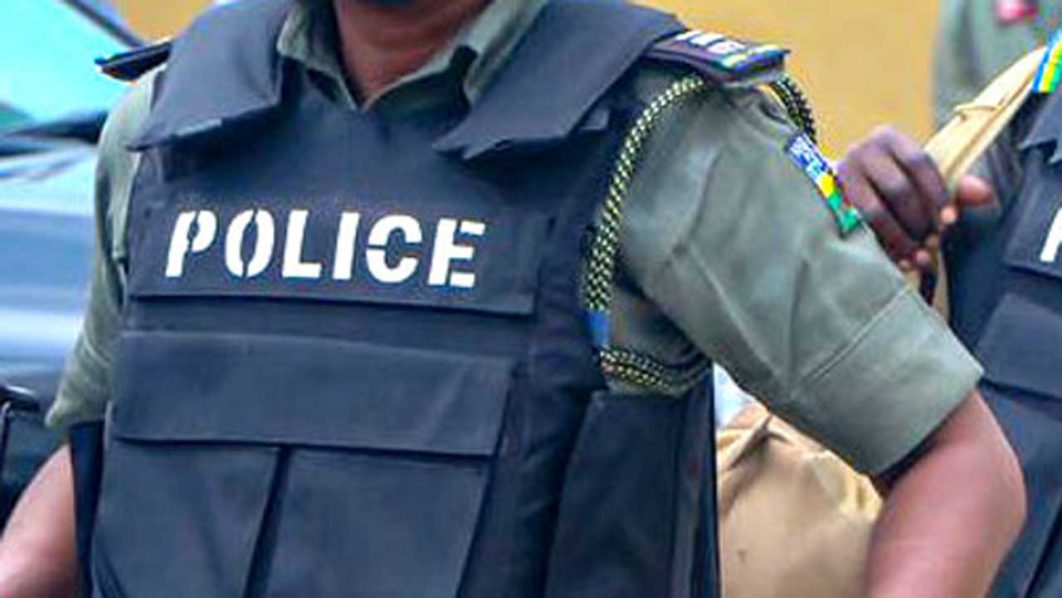






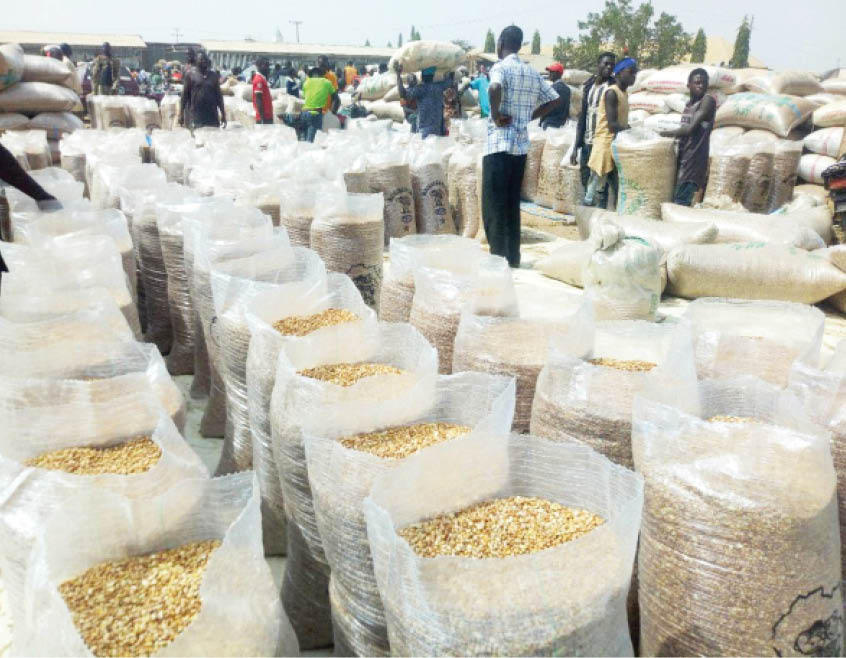


 English (US) ·
English (US) ·